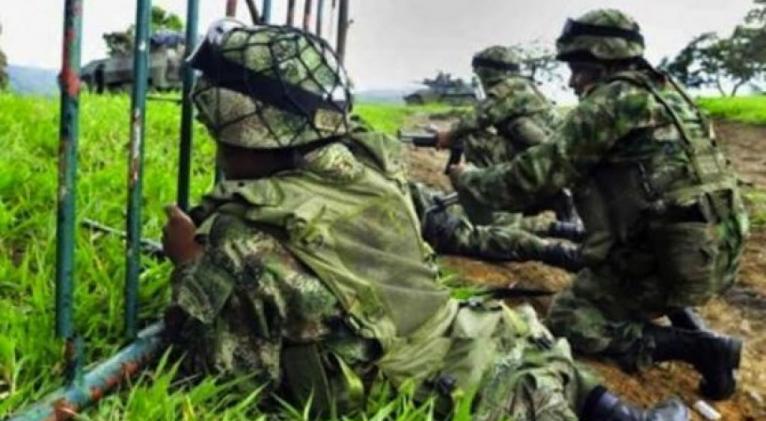Colombia's Peace Trembles as 2 FARC Rebels Killed in Combat
especiales

In a setback to major strides toward peace in Colombia, the bilateral cease-fire between the government and the FARC ruptured Wednesday as two rebel fighters were killed in combat in the northern department of Bolivar just days after the two sides of the more than 50-year-old conflict signed a new peace agreement.
OPINION: Colombia: The Just Cause for Peace and Unity
The Revolution Armed Forces of Colombia, the country’s largest guerrilla army, identified the two fallen fighters as Monica and Joaco of the group’s Front 37 unit.
Differing versions of events have surfaced from FARC commanders and Colombian authorities. The Ministry of Defense reports that the armed guerrilla rebels were well outside their designated areas and carrying out criminal activities. FARC leaders, ontheother hand, claim that the troops were marching on route to so-called “pre-concentration” areas where members of the rebel army are gathering ahead of the final process of demobilization and laying down of arms.
 Source: Twitter / @Ricardo_TFARC
Source: Twitter / @Ricardo_TFARC
However, both sides of the more than half century-long civil war agreed that the incident underlines the fragility of the bilateral cease-fire and the urgency of implementing the newly-updated peace agreement, finalized after four years of talks in Havana, Cuba.
Chief government peace negotiator Humberto de la Calle told local media Wednesday that the “discrepancy of narratives” isn’t the central issue. “The important this is the lesson that (the ceasefire) is fragile; we cannot delay,” he said.
The FARC has called for an “official statement” from the U.N.-backed mission charged with monitoring and verifying the cease-fire to clarify the facts around the incident. FARC leader Luis Antonio Losada, also known by his alias Carlos Antonio Lozada, wrote on his Twitter account that the military’s version of events “lacks validity,” calling on the monitoring and verification body to “determine the circumstances” that led to the deaths of the two rebels.
Spanish lawyer Enrique Santiago, who has served as a legal advisor to the FARC during the peace negotiations in Havana, wrote on his Twitter account that the two rebels were killed “by a sniper,” adding that the “violation of the bilateral cease-fire is a war crime.”
The cease-fire officially launched on Aug. 29 after the FARC and government teams finalized a historic peace agreement at the negotiation table in Havana. The agreement to cease hostilities is credited with significantly reducing violence in the country, home to the longest-running civil war in the Western Hemisphere.
But the future of the cease-fire and breakthrough rapprochement was thrust into uncertainty when voters narrowly rejected the peace agreement by less than half a percentage point in the Oct. 2 plebiscite on the deal. Negotiators restarted talks and the cease-fire was extended until the end of the year while the country’s fledgling peace hung in political limbo.
FARC and government negotiators signed a new peace deal in Havana Saturday after taking into consideration hundreds of proposals for changes from diverse sectors of Colombian society. Both sides of the conflict have described the new deal as “definitive.”
OPINION: Colombia’s Failed Peace Throws Prisoners' Rights Into Question
Colombian President Juan Manuel Santos, currently in the United States to undergo medical exams for a possible prostate cancer relapse, had repeatedly stressed the urgency of salvaging the peace deal as soon as possible to guard against threats to the delicate cease-fire.
As part of the peace deal, FARC rebels demobilize in the coming months, moving out of their jungle camps into 27 transitional zones across the country. Once they have laid down their weapons, which will be melted down to create three peace monuments, they will reorganize as a political party.
The killing of the two FARC rebels marked the first documented break in some 80 days of the official bilateral cease-fire and, according to the Center for Resources for Analysis of the Conflict, the first armed confrontation in 131 days without combat between government forces and the FARC. The center’s director, Jorge Restrepo, argued on his Twitter account that the “only way to stop the conflict and get out of the situation of risk is to begin disarmament” now that the new peace deal has been signed.
FARC leader Rodrigo Granda, also known by his nom de guerre Ricardo Tellez, wrote on his Twitter account celebrating Monica and Joaco as “heroes of peace for Colombia.”
Colombia’s 52-year internal conflict has claimed some 260,000 lives and victimized at least 8 million more Colombians.













Add new comment